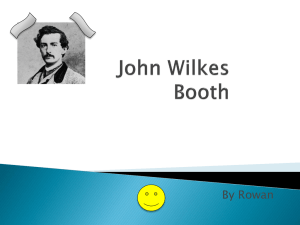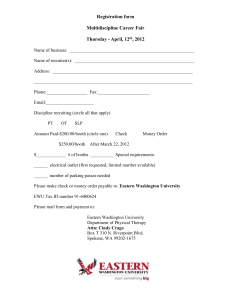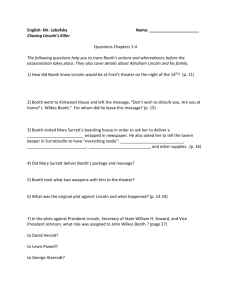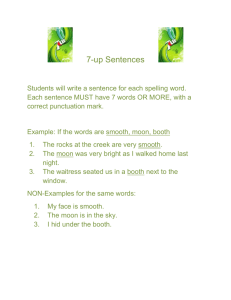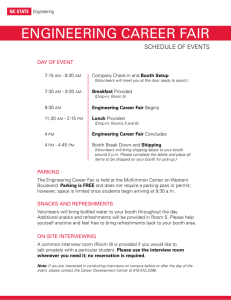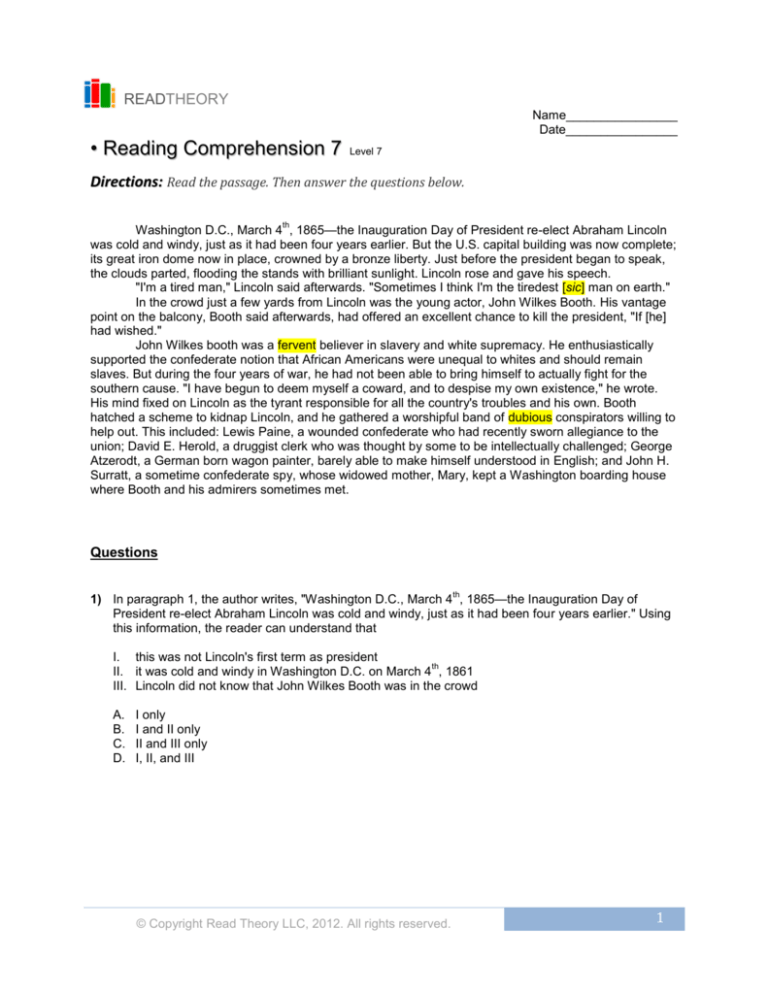
READTHEORY
Name________________
Date________________
• Reading Comprehension 7
Level 7
Directions: Read the passage. Then answer the questions below.
th
Washington D.C., March 4 , 1865—the Inauguration Day of President re-elect Abraham Lincoln
was cold and windy, just as it had been four years earlier. But the U.S. capital building was now complete;
its great iron dome now in place, crowned by a bronze liberty. Just before the president began to speak,
the clouds parted, flooding the stands with brilliant sunlight. Lincoln rose and gave his speech.
"I'm a tired man," Lincoln said afterwards. "Sometimes I think I'm the tiredest [sic] man on earth."
In the crowd just a few yards from Lincoln was the young actor, John Wilkes Booth. His vantage
point on the balcony, Booth said afterwards, had offered an excellent chance to kill the president, "If [he]
had wished."
John Wilkes booth was a fervent believer in slavery and white supremacy. He enthusiastically
supported the confederate notion that African Americans were unequal to whites and should remain
slaves. But during the four years of war, he had not been able to bring himself to actually fight for the
southern cause. "I have begun to deem myself a coward, and to despise my own existence," he wrote.
His mind fixed on Lincoln as the tyrant responsible for all the country's troubles and his own. Booth
hatched a scheme to kidnap Lincoln, and he gathered a worshipful band of dubious conspirators willing to
help out. This included: Lewis Paine, a wounded confederate who had recently sworn allegiance to the
union; David E. Herold, a druggist clerk who was thought by some to be intellectually challenged; George
Atzerodt, a German born wagon painter, barely able to make himself understood in English; and John H.
Surratt, a sometime confederate spy, whose widowed mother, Mary, kept a Washington boarding house
where Booth and his admirers sometimes met.
Questions
th
1) In paragraph 1, the author writes, "Washington D.C., March 4 , 1865—the Inauguration Day of
President re-elect Abraham Lincoln was cold and windy, just as it had been four years earlier." Using
this information, the reader can understand that
I. this was not Lincoln's first term as president
th
II. it was cold and windy in Washington D.C. on March 4 , 1861
III. Lincoln did not know that John Wilkes Booth was in the crowd
A.
B.
C.
D.
I only
I and II only
II and III only
I, II, and III
© Copyright Read Theory LLC, 2012. All rights reserved.
1
2) In paragraph 2, the author uses the term "[sic]." This is used to show the reader that a word or phrase
was used incorrectly by the speaker, but that the author still wishes to preserve the speaker's actual
language. In this case, the author writes "[sic]" after the word "tiredest" to show that it is used
incorrectly (the correct form is "more tired"). Using this information, which of the following quotations
should the term "[sic]" be applied to?
A.
B.
C.
D.
"Tommy bought a new bike down at the new bicycle shop."
"Some plants require a great deal of light in order to grow."
"No one knows this town like I do."
"Jessica Hampton is my bestest friend."
3) According to the author, what was John Wilkes Booth's profession?
A.
B.
C.
D.
writer
soldier
politician
actor
4) Marco is a fervent believer in animal rights. One day, Marco learns that the animals in a nearby zoo
are being mistreated. Which of the following sentences describes how Marco would most likely react
after learning this information?
A.
B.
C.
D.
Marco sighs and continues playing video games.
Marco does internet research with the hope of learning more.
Marco monitors updates on a local news channel.
Marco joins a protest outside the zoo entrance.
5) John Wilkes Booth can best be described as
A.
B.
C.
D.
treacherous, meaning unfaithful or disloyal
patriotic, meaning devoted to one's country
amicable, meaning friendly or agreeable
idiotic, meaning senselessly foolish or stupid
6) As used in the final paragraph, dubious most nearly means
A.
B.
C.
D.
questionable
uneducated
evil
greedy
© Copyright Read Theory LLC, 2012. All rights reserved.
2
Answers and Explanations
1) B
In paragraph 1, the author writes, “the Inauguration Day of President re-elect Abraham Lincoln was cold and windy, just as it had
been four years earlier.” Several clues in this selection let us know that this was not Lincoln’s first term as president. First, Lincoln is
referred to as “President re-elect, which lets us know that he had been president before. Also, the day “four years earlier” is
mentioned. Since we know that presidential elections, and as a result Inauguration Days, take place every four years, we can
conclude that Lincoln had been inaugurated four years earlier. Using this information, we can tell that this was not Lincoln’s first term
as president. This supports option (I). In paragraph 1, the author writes, “Washington D.C., March 4, 1865—the Inauguration Day of
President re-elect Abraham Lincoln was cold and windy, just as it had been four years earlier." Since the author notes that it was
“cold and windy…four years earlier,” and March 4th, 1861 is exactly four years earlier, we can conclude that it was cold and windy in
Washington D.C. on March 4th, 1861. This supports option (II). The author does not provide any information for us to conclude that
Lincoln did not know that John Wilkes Booth was in the crowd. This means we can eliminate option (III). Therefore (B) is correct.
2) D
Using the information above, we can tell that we are looking for the quotation that contains a word or phrase that is used incorrectly.
Since the author writes “[sic]” after Lincoln’s use of “tiredest” because it should read more tired, we can tell that “tiredest” must be
used incorrectly. In the quotation, “Jessica Hampton is my bestest friend,” the word “bestest” is used in the same incorrect way as
Lincoln’s use of “tiredest.” This lets us know that the quotation, “Jessica Hampton is my bestest friend” should have the term “[sic]”
applied to it. Therefore (D) is correct. While the quotation, “Tommy bought a new bike down at the new bicycle chop” is repetitive, it
does not contain a word or phrase that is misused by the speaker. We can tell that in both instances where the speaker uses the
word new, he is using the adjective correctly. Although it sounds repetitive, the quotation does not misuse a word or phrase. This
means (A) is incorrect. While the quotation, “Some plants require a great deal of light in order to grow," might technically need a
comma between the word “light” and the phrase “in order to grow,” the speaker does not misuse a word or phrase here. This lets us
know that this quotation does not need to have the term “[sic]” applied to it. Therefore (B) is incorrect. The quotation, "No one knows
this town like I do,” does not misuse a word or phrase. This means that it does not need to have the term “[sic]” applied to it, and (C)
is incorrect.
3) D
In paragraph 3, the author writes, “In the crowd just a few yards from Lincoln was the young actor, John Wilkes Booth.” This lets us
know that John Wilkes Booth was an actor. Therefore (D) is correct. The author does not provide information to support choices (A),
(B), or (C). Therefore they are incorrect.
4) D
fervent (adjective): having or displaying a passionate intensity.
In paragraph 4, the author writes, “John Wilkes booth was a fervent believer in slavery and white supremacy.” We can use context
clues—hints from known words or phrases around the unknown word or phrase—to help us figure out what fervent most nearly
means. In the next sentence, the author writes, “He enthusiastically supported the confederate notion that African Americans were
unequal to whites and should remain slaves.” We can tell that these two sentences are parallel—or similar in structure—because we
know that “slavery and white supremacy” in the first sentence aligns with the “notion that African Americans were unequal to whites
and should remain slaves” in the second sentence. This means that the phrase “fervent believer” at the beginning of the first
sentence must align with the phrase “enthusiastically supported” at the beginning of the second sentence. Using this information, we
can tell that fervent must mean something like having or displaying an enthusiastic, passionate intensity. If Marco has an
enthusiastic and passionately intense belief in animal rights, and he learned that animals were being mistreated, we can tell that he
would most likely react by joining a protest outside the zoo entrance. This is because people protest when they feel passionately
about something. Therefore (D) is correct. Using the above information, we can tell that we are looking for the reaction that reflects
an enthusiastic or passionate intensity for animal rights. If Marco sighs and continues playing video games, this would not reflect an
enthusiastic, passionate intensity, because it hardly reflects a response at all. Marco’s sigh is merely a small acknowledgement of
the mistreatment of animals described in the scenario. This lets us know that the sentence, Marco sighs and continues playing video
games, does not describe how Marco—a fervent believer in animal rights—would most likely react after learning that animals were
mistreated. This means (A) is incorrect. Using the above information, we can tell that we are looking for the reaction that reflects an
enthusiastic or passionate intensity for animal rights. If, in reaction to hearing about the mistreatment of animals, Marco does
internet research with the hope of learning more, this would not reflect an enthusiastic, passionate intensity. This is because internet
research is a relatively passive response for a fervent believer of animal rights to take, after hearing about the mistreatment of
animals. This lets us know that the sentence, Marco does internet research with the hope of learning more, does not describe how
Marco—a fervent believer in animal rights—would most likely react after learning that animals were mistreated. Therefore (B) is
incorrect. Using the above information, we can tell that we are looking for the reaction that reflects an enthusiastic or passionate
intensity for animal rights. If, in reaction to hearing about the mistreatment of animals, Marco monitors updates on a local news
channel, this would not reflect an enthusiastic, passionate intensity, because monitoring the news on TV is a relatively passive
response for a fervent believer of animal rights to take, upon hearing about the mistreatment of animals. This lets us know that the
sentence, Marco monitors updates on a local news channel, does not describe how Marco—a fervent believer in animal rights—
would most likely react after learning that animals were mistreated. Therefore (C) is incorrect.
5) A
In paragraph 4, the author writes, “[John Wilkes Booth] enthusiastically supported the confederate notion that African Americans
were unequal to whites and should remain slaves. But during the four years of war, he had not been able to bring himself to actually
fight for the southern cause.” This lets us know that even though Booth supported the ideas behind confederate cause, he was
disloyal or unfaithful to the confederacy because “he had not been able to bring himself to actually fight for the southern cause.”
Because of this unfaithfulness and disloyalty, the author writes that Booth even began to consider himself a “coward.” Also,
© Copyright Read Theory LLC, 2012. All rights reserved.
3
“hatch[ing] a scheme” to kidnap the president of your own country is unfaithful and disloyal. Using this information, we can tell that
John Wilkes Booth can best be described as treacherous, meaning unfaithful or disloyal. Therefore (A) is correct. The author writes
that John Wilkes Booth and his gang were planning to kidnap the president of the United States. We know that the president is the
figurehead of the United States. Therefore, John Wilkes Booth cannot best be described as patriotic, meaning devoted to one’s
country, since he wanted to kidnap his country’s president. This means (B) is incorrect. The author writes, “John Wilkes booth was a
fervent believer in slavery and white supremacy. He enthusiastically supported the confederate notion that African Americans were
unequal to whites and should remain slaves.” Since we would not describe proponents of enslaving others as “friendly or
agreeable,” it would not be accurate to say that John Wilkes Booth can best be described as amicable, meaning friendly or
agreeable. This means (C) is incorrect. The author writes, “Booth hatched a scheme to kidnap Lincoln, and he gathered a worshipful
band of dubious conspirators willing to help out.” While this scheme might be in poor taste, given that Lincoln worked to end slavery,
it would be much too strong to say that John Wilkes Booth can best be described as idiotic, meaning senselessly foolish or stupid.
Although immoral, John Wilkes Booth rationale for disliking the president makes sense given Booth’s beliefs about slavery in
comparison to Lincoln’s. This means it would not be accurate to say that John Wilkes Booth can best be described as idiotic,
meaning senselessly foolish or stupid. Because this word is too strong, (D) is correct.
6) A
dubious (adjective): questionable; hesitating or doubting.
In paragraph 4, the author writes, “Booth hatched a scheme to kidnap Lincoln, and he gathered a worshipful band of dubious
conspirators willing to help out.” We can use context clues—hints from known words or phrases around the unknown word or
phrase—to help us figure out what dubious most nearly means. After this selection, the author lists the conspirators, each with a
brief description. By looking closely at the common aspects of the descriptions of the conspirators, we can figure out what dubious
most nearly means. The conspirators included a “wounded confederate,” an “intellectually challenged” clerk, a painter who spoke
poor English, and a spy. All of these attributes make the candidates unlikely, questionable choices for the type of team necessary to
complete a mentally and physically complicated task like kidnapping the president. This lets us know that dubious most nearly
means questionable. Therefore (A) is correct. The author does not provide information to supports choices (B), (C), or (D).
Therefore they are incorrect.
© Copyright Read Theory LLC, 2012. All rights reserved.
4

